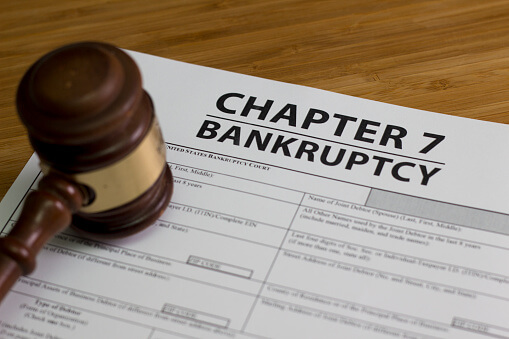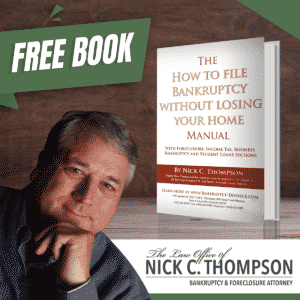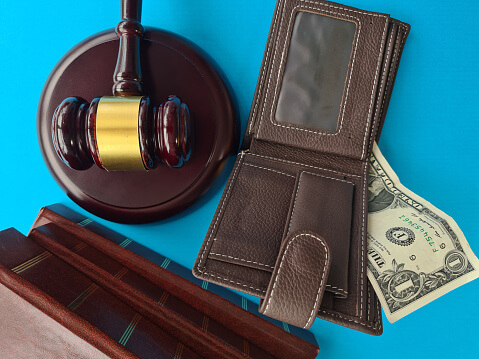Are you facing a Chapter 7 or Chapter 13 bankruptcy? What are the distinguishing factors between bankruptcy cases being closed and discharged?
This article is focused on offering you all the essential information about it and why you must contact a professional bankruptcy attorney.
What is the Difference Between Being Closed, Dismissed, and Discharged?
Having your Chapter 7 bankruptcy discharged means you have completed Chapter 7 and a permanent court order called the discharge now protects you forever.
Creditors have a limited time to object to your bankruptcy. The case is now basically over; normally, it is closed just a couple of days after the discharge is issued.
Having your case dismissed means you did not get the discharge order due to misconduct by the debtor or your local attorney. You may or may not be able to refile a second case.
Some people are barred from refiling for years or permanently due to negligent or intentional conduct, often involving fraud. This record will be on your credit for ten years. There is no normal method for removing it from a credit report.
What Does a Chapter 7 Bankruptcy Dismissal Mean?

The debtor has a set of responsibilities to the court when he files a bankruptcy petition. The petition must be complete and accurate. You can give property away before filing, but you must disclose any transfer to the trustee and the court. The bankruptcy code penalty for fraud is often a denial of the discharge, and this can include under 11 USC 707 and 727 the right to ever file bankruptcy again.
Even if you dismiss your bankruptcy case, you will often lose the right to discharge the debts you had in your first filing under these statutes. The bankruptcy code awards the bankruptcy lawyer and poor deserving debtor for properly preparing the petition. The court punishes the fraudulent filer or debtor who abuses the system. Generally speaking, you don’t want to appear in court before an angry federal judge.
When are Debtors Subject to a Charge of Abuse Under the Bankruptcy Code?
Section 109g Repeat Filing Abuse as a Reason for Dismissal
Some debtors will file repeated case after case. This is often done by persons who are desperate to stop foreclosure. Eventually, the bankruptcy court or the creditor files a motion to bar the debtor from refiling for years so the foreclosure can proceed. The bankruptcy attorney who knowingly aids this abuse will get a reputation for it.
Income Based Reasons for Dismissal Filing a Chapter 7 in Bad Faith
The bankruptcy process depends on bankruptcy cases where the poor but honest debtor requested and deserved a fresh start. If a debtor files a Chapter 7, he qualifies because his income is so small that he cannot afford the repayment plan of a Chapter 13 bankruptcy.
If a debtor hides income or has enough income to repay but refuses to use Chapter 13, the case will be dismissed as filing in bad faith. The means test is designed to place higher-income debtors into a Chapter 13 bankruptcy. If you make under your state median income for your size family, the means test automatically allows you to file Chapter 7.
Fraud and Hiding Assets as a Basis for Dismissal
You can only exempt your assets. You cannot use your exemptions on the property you give away. That property belongs to someone else. The debtor fears losing assets and is often tempted to transfer assets just before filing. Hiding assets is a guaranteed way to lose them. You cannot exempt an asset if you do not list it in your petition.
Failure to Pay the Filing Fee Causes Dismissal
Sometimes a client wants to pay the filing fee in installments. If you fail to make timely payments will cause the case to be dismissed. However, you may often be able to reinstate the case. You are better off never asking for paying is a case dismissal. However, a bankruptcy case can be reinstated, and the dismissal of bankruptcy can be set aside by filing the appropriate motions before the case closes. If you wait too long after the bankruptcy dismissal, the case will close, and you are often better off refiling.
Failure to Attend the 341 Meeting of Creditors or to Provide Documents
The first bankruptcy papers you receive will advise you of the time and place for your hearing. Most people only have this one hearing where the trustee and creditors are allowed to ask questions. Another page on our website lists these questions about your financial management and financial affairs. The failure to attend the meeting of creditors will mean dismissal. If the debtor physically cannot attend the meeting of creditors, the debtor can file a motion to answer the questions by interrogatories under oath.
You only have limited time to supply the documents to the trustee. This is why a bankruptcy law firm will require the documents to be in their possession before the case is filed. The failure to provide documentation, including tax returns, guarantees case dismissal of the bankruptcy.
Failing to Take a Credit Counseling Course and Incomplete Schedules

No bankruptcy case can be filed without first taking the required credit counseling and obtaining the credit counseling certificate. If this certificate is not filed with the case, the Chapter 7 or Chapter 13 bankruptcy case is dismissed automatically. This certificate must be from an approved credit counseling agency.
Failing to take the second financial management class will mean the case will close without a discharge. Failing to take the financial management course does not mean dismissal. A debtor still will not get debt relief from his or her debts. To get the discharge, the case will have to be reopened. This often requires paying a new filing fee to file the financial management certificate and a request for discharge.
Similarly, the bankruptcy code requires the bankruptcy attorney to file complete schedules or have the case dismissed shortly after the case is opened. If the debtor will not co-operate and fully and accurately supply the information in the schedules, the debtor may be barred from refiling. How long the debtor is barred is up to the bankruptcy judge.
How to Get Chapter 7 Dismissed Properly?
The proper way to dismiss Chapter 7 is to file a motion and order asking the court to grant the dismissal of a case. You asked to be in Chapter 7, and if you obey the rules, the bankruptcy court protects you. But the same rules can keep you trapped inside the bankruptcy case if you don’t.
The debtor who commits fraud has given the Bankruptcy trustee all the same rights as a creditor who has gotten a judgment and a lien against all of the debtor’s property. The debtor can ask for voluntary dismissal of a Chapter 7 bankruptcy, but the debtor has no right to a voluntary dismissal.
Essentially the Trustee now has a right to keep the debtor in Chapter 7 to liquidate those assets and sue the people who were given property up to two years before filing the bankruptcy. In the case of a self-settled trust, the trustee can go back up to ten years.
What Problems Exist for Chapter 13 Dismissal Repeat Filers?

Chapter 13 has all the same rules and responsibilities for having a complete and accurate petition that Chapter 7 has. However, in Chapter 13, the trustee rarely objects to a dismissal. The court may ban the debtor from refining or denying a discharge. Normally, this is based on the court finding the debtor committed fraud.
Creditors rarely object to a debtor’s case being dismissed. However, the court can keep the debtor captive in Chapter 13 or 7 to prevent the debtor from refiling. This keeps the debtor from filing a subsequent case to stop foreclosure.
Some debtors file Chapter 13 cases repeatedly. If you file to dismiss your case after a motion for relief from stay, the automatic stay in a new case filed within 180 days must be extended. The stay terminates without this motion. If you have two cases filed within the last year, there is no automatic stay, and even if you filed a Chapter 13 to stop the foreclosure, any sale of the home is valid.

What Happens if My Chapter 7 Bankruptcy Case is Dismissed?
Your initial bankruptcy papers will say the automatic stay is in effect until the case is dismissed, discharged or until a creditor obtains permission to terminate the stay. The discharge protects you permanently, and as soon as the bankruptcy filing case is dismissed, the automatic stay terminates. Creditors are free to return to the collection activity.
You never want a moment to lapse between the automatic stay and the discharge. But if the case is dismissed, pay stubs may have wage garnishments that can return, any valuable asset can be taken with a writ of replevin, and collection actions return to full activity.
How Quickly Can I Refile My Chapter 7 Bankruptcy Case is Dismissed?
The answer to dismissal is often not to reinstate the previous case with any of its problems. Now that you know the problems, you are often better off filing a new case. Unless the court finds you guilty and unable to file bankruptcy again, you can normally refile immediately. Your attorney should now be aware of any problem which may have been hidden before.
Certain debts like taxes may not be dischargeable due to the prior case, or you may have to wait for debts to return to be dischargeable. Facts change, and you may now be forced to file as a Chapter 13.
How Does a Dismissed Chapter 7 Bankruptcy Stay on Your Credit Report?
Dismissing a Chapter 7 bankruptcy is rare. But there can be valid reasons when the court grants dismissal. Only untrue information can be reported. Filing bankruptcy can be on your credit for ten years regardless of which bankruptcy chapter was filed.
Getting it removed from your report is nearly impossible. If your spouse filed bankruptcy, their information does not appear on your credit. But if a debt is not paid, that information is reported.
What Happens to the Property if a Chapter 7 Bankruptcy is Dismissed?

If you file bankruptcy but have a case dismissed, you lose the protection of the automatic stay and the ability to have the debts discharged.
Property can be repossessed or foreclosed. Wages can be garnished if the credit has obtained a judgment. You essentially go back to owing all the secured and unsecured debts and lose any court protection. You can offer creditors some repayment plan, but you can’t force terms on the creditor, who often refuses to listen. Only your attorney and the bankruptcy court can protect you and offer legal help and protection of the automatic stay.
Contact Us, If You are Looking for the Best Professional Assistance!
Sometimes we can have a case reinstated. Congress established that a bankruptcy law firm was a debt relief agency in 2005. The attorney-client relationship allows our law firm to keep your information confidential. We offer up to two hours with me as your attorney in our free bankruptcy evaluation of bankruptcy cases. Completing the bankruptcy process and the bankruptcy discharge is important. Bankruptcy laws do not allow mistakes.
I try to educate our clients in the free consultation about the issues involved and plan filing for bankruptcy, so goals are met. A Chapter 13 bankruptcy payment plan must be designed to be affordable and to meet your goals. If you need a bankruptcy case dismissed, it is often because the first one was improperly prepared.
A local attorney is often a jack of all trades and master of none. When you file bankruptcy, an experienced and knowledgeable attorney usually means the difference between qualifying for a Chapter 7 or being stuck in Chapter 13, which has payments for five years. If you have had your case dismissed, it is probably because it was not planned properly. Call us if you want your case to be handled by professionals.

Resources for Bankruptcy
Louisville, Kentucky Bankruptcy Forms
Benefits of a Chapter 7 Bankruptcy • Video
What is the Student Loan Brunner Test?
Filing Chapter 7 & Chapter 13 Bankruptcy
Student Loan Bankruptcy Qualifications
Chapter 11 Business Bankruptcy Information
If you are considering bankruptcy, don’t delay because timing is crucial. I am here to help you. So, contact my office immediately to start the conversation—Nick C. Thompson, Bankruptcy Lawyer: 502-625-0905.


